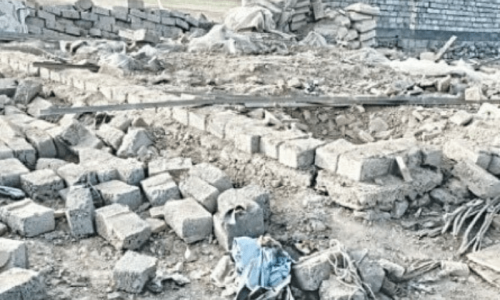PESHAWAR: Lack of proper disposal of waste generated from the quarantine and isolation centres and hospitals and personal protective equipment used by the health healthcare workers dealing with suspected or positive Covid-19 patients is likely to spread the virus among the population, according to experts.
The government is yet to enforce the SOPs, aimed at preventing spread of virus from waste of centres housing Covid-19 patients, issued by the ministry of health two months ago to safeguard people from the infection.
They said that the SoPs were part of National Action Plan Covid-19 Pakistan circulated to all provinces two months ago when there was no confirmed case in the country.
Khyber Pakhtunkhwa lacks mechanism for the proper of disposal of PPEs, which are thrown and treated as municipal waste despite clear guidelines on how to dispose of them for the safety and prevention of the Covid-19.
Experts say province lacks mechanism for proper disposal of PPEs
Health officials said they knew that there had been positive cases isolated in their homes in Hayatabadd and Hassan Garhi and city areas but the waste from there was not handled properly that could be a ticking bomb for the neighbourhoods.
“This is happening in Peshawar, the capital of the province, whereas situation in other districts is alarming,” they said. They said that people were throwing used kits and other PPEs in the streets and even the hospitals did not follow protocols.
The SOPs were meant to protect health employees, visitors and environment from hazards of waste produced at different levels in order to maintain a safe, healthy and productive work environment in hospitals and prevent spread of the virus, said a document.
All the waste generated from laboratories, hospitals and quarantine and isolation facilities for Covid-19 cases should be treated as “infectious waste” and should not be discarded in landfills as these entail 95 per cent more risk of spread the virus than any other cause of its spread.
The patient’s care providers, wearing “dirty PPE” should remove all equipment, supplies and linen before leaving the duty places to be placed in the containers and transported directly for incineration. All waste, including PPE, drapes and wipes, should be considered infectious substance and should be packaged appropriately for disposal.
“Wear gloves and protective clothing, including overall, shoe covers, face and eye protection. Cover the spill with cloth or paper towels to contain it. Pour an appropriate disinfectant over the paper towels and the immediately surrounding area, generally with five per cent bleach solutions,” said the SoPs.
After 30 minutes, clear away the materials and if there is broken glass or other sharps involved, use a dustpan or a piece of stiff cardboard to collect the material and deposit it into a puncture-resistant container.
Sources said that health department got the national guidelines regarding handling of Covid-19 waste and PPEs, which was a high-risk emergency problem, but those were ignored.
Currently, the province has a total of 62 incinerators and 57 of them have been installed without obtaining ‘no objection certificate’ from Environmental Protection Agency. Only three of them are functional and that too in Peshawar-based hospitals.
The locally manufactured incinerators installed for disposing of infectious waste lacked maintenance according to laid out standards that caused billions of rupees to the government, sources said.
A month ago, a senior health official visited Punjab where incineration was done by private parties and after return, he prepared a summary that was sanctioned by Chief Secretary Dr Kazim Niaz for outsourcing the incineration of hospital waste. The summary was approved by Chief Minister Mahmood Khan on March 20 but the government was now engaged in Covid-19 and the incineration issue was put in cold storage, sources said.
Experts said that as emergency, the government should hire services of private company to do the job on the pattern of Punjab for which it had resources. The government has invoked health emergency and can do this without advertisement, tendering and other rules and regulations for survival of its people.
On April 7, the Supreme Court of Pakistan ordered government for measures and precautions of Covid-19 including disposal of waste and PPEs.
Health Secretary Imtiaz Hussain Shah told Dawn that they had prepared PC-1 to put in place proper mechanism for disposal of waste.
“The PC-1 will be presented in next meeting of PDWP for approval. Hopefully, it will get approval and we would be able to introduce a proper system for waste disposal for the safety of people from the health problems,” he said.
Published in Dawn, April 14th, 2020














































